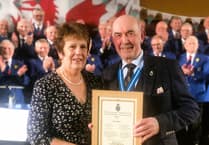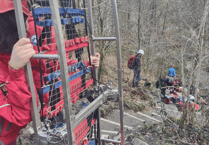“Don’t get stung by a bee thief,” robbery victim, local hobby bee keeper, feels obliged to be anonymous for the sake of remaining few hives.
A local amateur beekeeper is calling on fellow apiarists to take extra security precautions following the theft of a hive and colony of bees from a site near Brecon. However the victim is withholding his or her name in order not to be targeted again.
“I’m heart-broken,” says the beekeeper. “I’ve been nurturing this colony for some time. We amateur beekeepers get very emotionally attached to our bees. Following the ups-and-downs of the colony, the behaviour of the bees and what pollen they’re collecting and, above all, the health and performance of the colony queen.”
“Immediately after discovering that my hive had been stolen I relocated the remaining hives. I wouldn’t be able to sleep at night worrying that they could be stolen too.”
Bee colonies can be relatively small at this time of year, as they recover following the long winter, and the queen bee will have begun to lay to build up the colony to its maximum size in the summer.
Many hives are more visible as trees and shrubs are still to leaf. Arguably this makes bee hives more vulnerable to theft at this time of the year.
Chris Cardew, Chair of the Brecon and Radnor Beekeepers’ Association (BRBKA) has said: “This recent theft is a reminder for bee keepers to remain vigilant; keeping hives out of sight and locking-up where possible. Where colonies are offered for sale, their provenance should be checked.”
Chris added: “At BRBKA, we’ve introduced a new role, a coordinator who will be able to help newcomers to source bees without fear that they are previously stolen and also to monitor and optimise bee colony health. The role is called our “Nuc (pronounced nuke) Coordinator,” referring to the technical term used for the small nucleus (or foundation) of a newly forming colony.”
Theft of bees is relatively rare owing to their nature and the relative absence of a market for them as stolen goods. However there are thought to be about 200 recorded instances in England and Wales in the past 10 years.
The bees were stolen from a site of three similar hives in a location near Brecon. “It’s very distressing to think that to steal a bee hive which contains thousands of potentially stinging bees really needs some understanding of bee-keeping, some equipment and some planning. The perpetrator is likely to be someone who knows someone who wants a hive, or may be a beekeeper him or her-self.”
The victim started bee keeping as a hobby about 5 years ago. “It started following the gift of a one-day taster course from my family.
"I’ve gained great pleasure in looking after my four hives, helping them through tough winters and watching the colonies grow in the warmer months. I supply some honey to family and friends: after the cost of equipment, food and pest treatment I certainly don’t make a profit. It’s been a labour-of-love.”
“The replacement value of the hive and equipment is about £400, but sale of my well used goods won’t make anywhere near that. This hive might have produced between 20-40 1lb jars of honey.”
“Local beekeepers should be alert and take special precautions,” The bee-keeper said.
“I’ve learned the hard way that apiaries need to be located away from roads and other public access, invisible and behind fences and locked gates if possible.
“Professional apiarists use hive marking systems, security cameras, even microchips and special tracking devices in hives to protect their livelihood, but these are far beyond the pocket of a single amateur hobby beekeeper.”
“Nevertheless I’m calling on fellow beekeepers in the area to be very suspicious of informal offers of a hive and colony, or second hand bee-keeping equipment. Police have been notified.”




